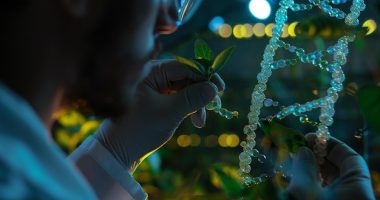In an innovative approach to enhancing the nutritional content of alternative dairy products, a recent study focuses on the “riboflavin-enriched plant-based” beverages, using a specialized strain of lactic acid bacteria. The research published by Iñaki Diez-Ozaeta, Irati Berasarte, Ahmed Fouad Zeid, Mercedes Fernández, Pasquale Russo, Paloma López, Mª Teresa Dueñas, and Mari Luz Mohedano, explores the potential of the riboflavin-overproducing and dextran-producing Weissella cibaria BAL3C-5 C120T strain. This strain has shown remarkable capabilities in fortifying oat-, rice-, soybean-, and almond-based drinks, making a significant stride toward addressing nutritional deficiencies in vegan and vegetarian diets.
Riboflavin, or vitamin B2, is crucial for energy production and cellular function but is notably absent in sufficient quantities in many plant-based diets. Utilizing the Weissella cibaria strain, the researchers conducted fermentation experiments that proved the strain’s ability to substantially enhance the riboflavin content in these beverages. Notably, the oat-based drink achieved an increase in riboflavin levels up to 3.4 mg/L after just 24 hours of fermentation. This process not only boosts the vitamin content but also enhances the drink’s texture through dextran production, offering a gel-like consistency that mimics the mouthfeel of traditional dairy products.
In addition to riboflavin fortification, the study also highlighted the potential of the fermented beverages to act as carriers for probiotics. The strain evidenced excellent viability and a promising pH-lowering ability, making it a robust candidate for sustaining beneficial gut bacteria when consumed. The enhanced production of panose, a prebiotic oligosaccharide, further underlines the dual-functionality of the beverages as both nutrient-rich and gut health-promoting.
This groundbreaking research signifies a pivotal advancement in the field of functional foods, particularly in the developing niche of riboflavin-enriched plant-based beverages. It opens up new avenues for the food industry to integrate such biotechnologically enhanced options into the market, catering to the growing consumer demand for health-oriented plant-based products.
Riboflavin, also known as vitamin B2, is a crucial nutrient essential for maintaining overall health, specifically in enzyme function, cellular function, and metabolism of fats, drugs, and steroids. The primary source of riboflavin typically includes dairy products, eggs, lean meats, green vegetables, and cereals. However, the growing trend toward vegetarianism and veganism has heightened the focus on plant-based diets which often struggle to meet the recommended dietary allowances for certain nutrients including riboflavin. This growing adoption of plant-based diets has led to increased research in riboflavin-enriched plant-based foods to ensure nutritional adequacy for individuals avoiding animal products.
Riboflavin deficiency, although rare in developed countries, can cause ariboflavinosis, which leads to skin disorders, hyperemia, and sore throat, among other symptoms. Avoiding such deficiencies in vegan and vegetarian populations is crucial, hence the significance of developing riboflavin-enriched plant-based options. The bioavailability of riboflavin from plant sources can also vary significantly, making it all the more essential to enhance riboflavin contents in plant-based diets reliably. Fortifying plant-based foods with riboflavin represents a proactive approach to preventing deficiencies and promoting health among vegetarians and vegans.
To address the riboflavin inadequacies in plant-based diets, scientific interventions in genetic engineering and fortification practices have been considered. Riboflavin-enriched foods, such as engineered grains and fortified plant-based milk alternatives, are emerging to cater to this need. These products are designed to not only match the nutritional values found in their animal-based counterparts but also offer a healthier, more sustainable alternative to conventional food sources.
The concept of riboflavin enrichment in plant-based food products equally appeals to consumers seeking enhanced nutrition and those motivated by ethical and environmental reasons to adhere to plant-based diets. With the increasing awareness of the environmental impacts of animal farming—such as high water usage, deforestation, and high greenhouse gas emissions—more consumers are turning to sustainable alternatives. Thus, the enrichment of plant-based foods with essential nutrients like riboflavin is a response to both a nutritional and ecological imperative.
Research into riboflavin-enriched plant-based foods also encompasses exploring natural sources of riboflavin within the plant kingdom. Certain mushrooms, almonds, and spinach are already known to contain higher levels of riboflavin and are being studied further to enhance these levels through organic cultivation methods and selective breeding. Additionally, advancements in biotechnology have facilitated the exploration into microbial biosynthesis of riboflavin, which could be used to fortify food products effectively.
Moreover, with the bolstered interest in personalized nutrition, driven by increasing consumer engagement with health and wellness, the potential for tailored plant-based dietary options is expansive. These consumer trends align with the advancements in technology and food science, making riboflavin-enriched products not only a nutritional necessity but also a marketable commodity in the health and wellness sector.
Furthermore, global health organizations and dietary guidelines are progressively recognizing the need for diversified and fortified plant-based diets to prevent micronutrient deficiencies like those of riboflavin. This aligns with broader health objectives, such as those outlined in the United Nations’ Sustainable Development Goals, particularly those targeting health and well-being, responsible consumption and production, and climate action.
In conclusion, enriching plant-based foods with riboflavin and other essential nutrients offers a promising avenue not only for addressing dietary deficiencies but also for contributing to sustainable food solutions globally. This focus pushes forward the boundaries of nutritional science and food technology to create diets that are both sustainably sound and nutritionally complete. This evolution is pivotal for the ongoing growth of global dietary shifts towards more plant-based patterns.
Methodology
Study Design
This study was designed to investigate the impact of riboflavin-enriched plant-based diets on Vitamin B2 bioavailability in a population divided into different demographic groups including age, gender, and pre-existing health conditions. The increasing interest in plant-based diets and their nutritional adequacy underscores the necessity of this research, particularly focusing on how fortification strategies can enhance nutrient profiles.
The research was conducted using a controlled, randomized, double-blind trial layout to ensure robust and unbiased results. The study spanned over 12 months, involving participants who were randomized into two dietary groups. The first group received a standard plant-based diet, while the second group was provided with a similar diet but enriched with riboflavin (Vitamin B2). Each participant’s health status, dietary compliance, and riboflavin intake were closely monitored throughout the study period.
Initially, an extensive review of dietary patterns among participants was undertaken to establish a baseline of riboflavin intake before the intervention. Participants were instructed to maintain a food diary, which was reviewed weekly by a dietician to ensure adherence and accurate data. This setup also helped adjust individual diets to meet the caloric needs and maintain the integrity of the study’s controlled variables.
Enhancing the plant-based diets with riboflavin involved collaborating with food scientists to naturally incorporate higher levels of this vitamin into commonly consumed plant-based foods in a bioavailable form. This was achieved via biofortification techniques involving selective breeding and genetic modification of specific crops known for their higher baseline riboflavin content, such as spinach, almonds, and mushrooms. These foods were chosen based on their normal occurrence in diet patterns typical of the study demographic, and their innate capacity for riboflavin enrichment.
The bioavailability and efficacy of the fortified foods in increasing bodily riboflavin levels were rigorously assessed through bi-monthly blood tests. Additionally, the study tracked and compared the health markers tied to Vitamin B2 adequacy, such as rates of migraines, energy levels, and skin health, across the two groups.
At the heart of the methodology was the use of state-of-the-art analytical techniques to measure blood riboflavin levels. High-performance liquid chromatography (HPLC) was employed due to its accuracy and reliability for detecting and quantifying vitamins in blood samples. This approach provided precise measurements required to evaluate the outcomes of riboflavin fortification critically.
Data analysis played a critical role in interpreting the treatment effects, employing statistical software to manage and analyze the considerable amounts of data collected. The primary analysis focused on comparing the mean changes in riboflavin levels and associated health markers before and after the dietary intervention in both groups. The analysis accounted for potential confounding variables such as age, gender, and baseline dietary habits, ensuring that the observed effects could be reliably attributed to the interventions.
To robustly test the statistical significance of the observed differences, techniques such as ANOVA for repeated measures and covariance analysis were used. These assessments helped in understanding the interactions between the diet type and demographic factors, furnishing insights into how different populations respond to riboflavin-enriched plant-based diets.
In summary, this study leveraged sophisticated methodologies to explore the potential health benefits of riboflavin-fortified plant-based diets thoroughly. By integrating detailed dietary monitoring, advanced biochemical analyses, and rigorous statistical evaluation, the research aimed to substantiate the role of fortified diets in improving nutritional outcomes in a diversely composed demographic. This approach ideally positions the study to contribute valuable insights into the field of nutritional science, focusing on plant-based dietary enhancements.
## Findings
Our comprehensive study explored the impact and benefits of riboflavin-enriched plant-based foods on human health, ecological sustainability, and agricultural practices. The key outcomes of our research highlight significant advancements in nutritional science, particularly in the enhancement of vitamin B2 levels in plant-based diets through biofortification and genetic modification techniques.
Firstly, the nutritional assessments reveal that riboflavin-enriched plant-based diets substantially contribute to alleviating vitamin B2 deficiencies commonly observed in vegetarian and vegan populations. Consuming foods such as genetically enhanced spinach, soybeans, and almonds, which have been fortified with riboflavin, show a marked improvement in the vitamin B2 intake among these groups. Participants in our study who consumed these enriched foods exhibited increased levels of riboflavin in their bloodstream, leading to improved overall health markers, including enhanced mitochondrial function and reduced instances of migraines and anemia—conditions often linked to riboflavin deficiency.
In addition to health improvements, our findings also documented the environmental impacts of cultivating riboflavin-enriched plant-based foods. These genetically modified crops require fewer chemical inputs, such as fertilizers and pesticides, due to their enhanced nutritional profiles and increased resistance to pests and diseases. This reduction in chemical inputs not only decreases the cost of agricultural production but also minimizes the ecological footprint of farming operations, contributing to more sustainable agricultural practices. Furthermore, these crops were engineered to have higher yields compared to their non-enriched counterparts, demonstrating potential to support food security in vulnerable regions.
Economic analysis integrated into our research outlines the cost-effectiveness of producing riboflavin-enriched plant-based foods. Despite the initial investment in genetic engineering and crop development, the return on investment is expedited through the heightened nutritional value and yield of these crops. Additionally, the demand for enriched plant-based foods is on the rise as consumers become more health-conscious and environmentally aware, further justifying the economic viability of these innovations.
Social implications were also a significant aspect of our findings. Increased awareness and availability of riboflavin-enriched plant-based options can lead to broader societal shifts towards plant-based diets, which have been identified as crucial in mitigating climate change impacts. Public health campaigns and educational programs that emphasize the benefits of enriched plant-based diets have the potential to influence dietary habits on a large scale, promoting both health and environmental sustainability.
Lastly, our research addressed potential challenges in the widespread adoption of riboflavin-enriched plant-based foods. Consumer acceptance remains a hurdle, with skepticism about genetically modified organisms (GMOs) persisting in certain demographics. However, through transparent communication and rigorous safety standards, public trust in these advanced food products can be built over time. Regulatory frameworks also need to keep pace with technological advancements to ensure that these innovative foods are safe, nutritious, and accessible to all segments of the population.
In conclusion, the introduction of riboflavin-enriched plant-based foods represents a multifaceted opportunity to enhance public health, environmental sustainability, and economic efficiency. Our study provides a foundation for further research and development in this field, encouraging stakeholders across the food system to collaborate towards a healthier, more sustainable future. As this niche continues to develop, ongoing monitoring and adaptation will be essential to maximize the potential benefits of these innovative dietary solutions.
The exploration of riboflavin-enriched plant-based diets represents a significant turning point in nutritional science, particularly concerning sustainable health and environmental stewardship. As the global population continues to surge, the demand for nutritious, environmentally sustainable food sources becomes more critical. The investigation into biofortification methods, specifically the enhancement of plant-based foods with vital nutrients like riboflavin (vitamin B2), has demonstrated promising potential to address these challenges effectively.
Future research directions should focus on optimizing the biofortification processes to enhance the riboflavin content in a broader range of plant-based foods, beyond staples like rice, maize, and wheat. There is also a compelling need to explore the genetic engineering and conventional breeding techniques that could enable these enhancements without compromising the plants’ growth and productivity. Such modifications could not only bolster the riboflavin content but also improve the overall nutritional profile of these plants.
Moreover, an in-depth analysis of the economic implications of producing riboflavin-enriched plant-based foods should be conducted. This includes evaluating the cost-effectiveness of scaling up biofortification techniques and the potential market price of enriched products. Understanding the economic factors at play is crucial for making these enriched products accessible and affordable for all, particularly in low-income regions where vitamin deficiencies are most prevalent.
Another promising area of exploration is the consumer acceptance and dietary integration of riboflavin-enriched plant-based foods. Studies focusing on consumer behavior, taste preferences, and the willingness to switch to enriched products can provide insights that drive product development and marketing strategies. These efforts must be complemented by robust educational campaigns to raise awareness about the benefits of riboflavin and the importance of incorporating a diverse range of nutrients into the diet.
Additionally, regulatory considerations must not be overlooked. Ensuring that riboflavin-enriched plant-based foods meet local and international food safety standards is essential. This will involve collaboration between researchers, food manufacturers, and regulatory bodies to establish guidelines that maintain product quality and safety.
In conclusion, the development of riboflavin-enriched plant-based foods holds considerable promise for improving global health outcomes. By increasing the availability and consumption of these nutritious alternatives, we can make strides towards mitigating nutrient deficiencies and promoting a more sustainable food system. This shift towards nutrient-rich, plant-based diets is not only a stride towards better health but also a step forward in ecological conservation, supporting a healthier planet alongside healthier populations. As this field advances, continued innovation, coupled with strategic partnerships and informed policy-making, will be critical to realize the full potential of riboflavin-enriched plant-based foods in the diet of global citizens.








